Leadership and Management: Corus Case Study and Operational Analysis
VerifiedAdded on 2021/02/21
|13
|4374
|57
Report
AI Summary
This report delves into the concepts of leadership and management, providing academic definitions for both leaders and managers, while also exploring the similarities and differences between them. It analyzes various management and leadership roles in organizational contexts, supported by relevant theories such as behavioral, scientific, autocratic, situational, systems, and contingency theories. The report uses the Corus steel manufacturing company as a case study, examining its key operational functions and the importance of operations management in achieving business objectives. It evaluates the impact of external business environment factors on decision-making and explores how operational efficiencies were improved to meet business objectives, concluding with recommendations for future improvements. The report also discusses how Corus leverages its operational knowledge to gain a competitive edge and secure new business opportunities. Furthermore, it provides a detailed analysis of how different leadership styles and management approaches are implemented within Corus to address various organizational situations such as employee turnover and sales growth.
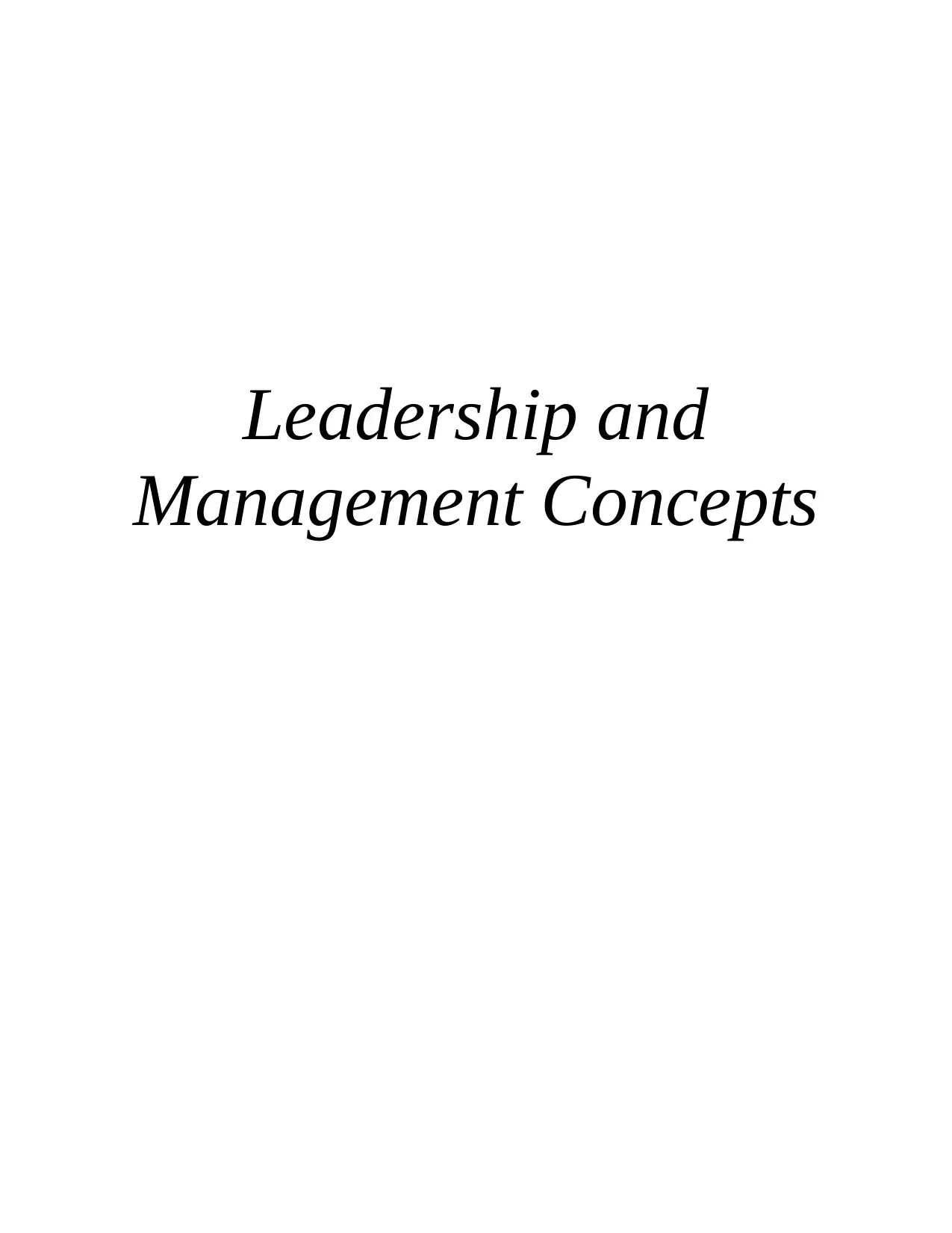
Leadership and
Management Concepts
Management Concepts
Paraphrase This Document
Need a fresh take? Get an instant paraphrase of this document with our AI Paraphraser
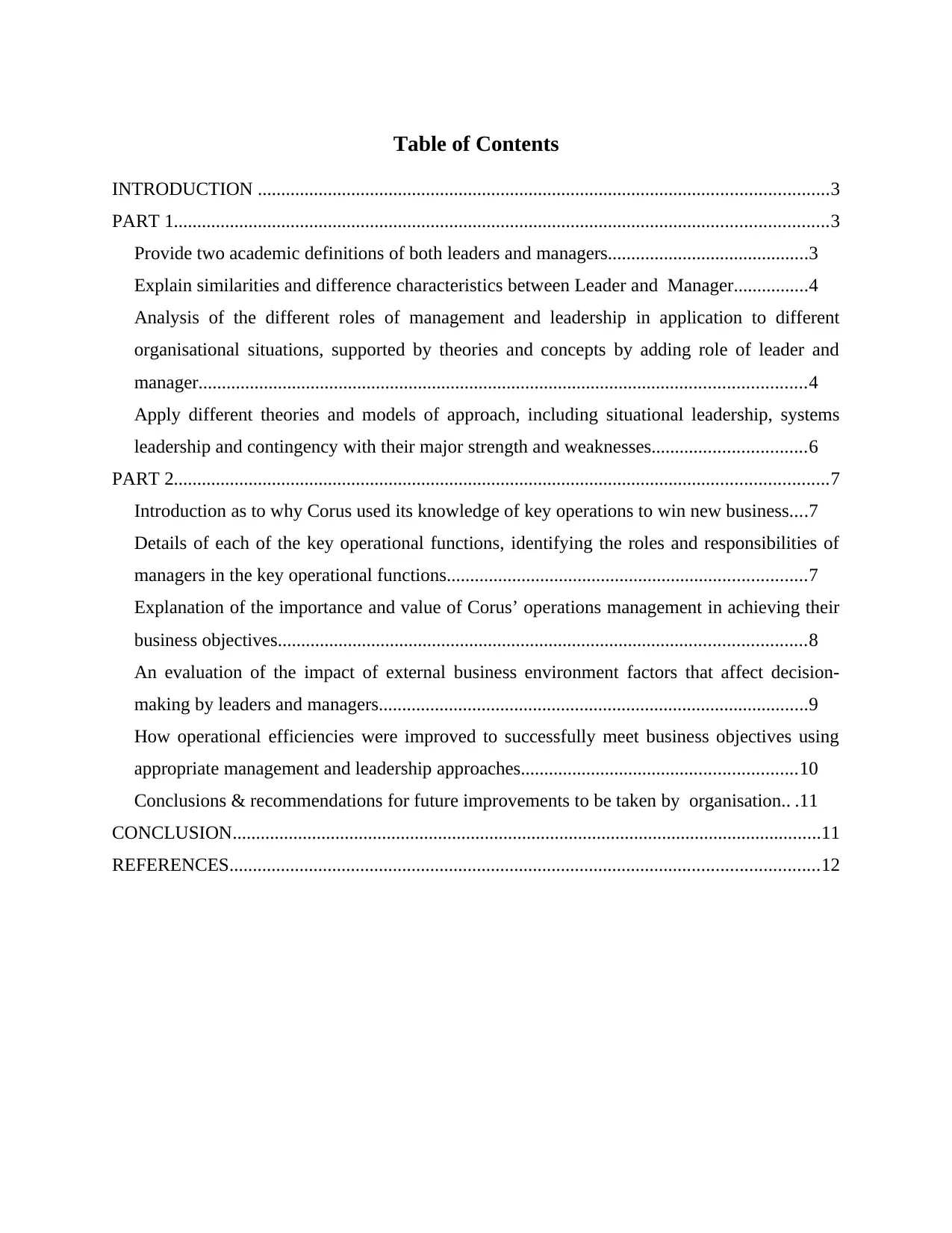
Table of Contents
INTRODUCTION ..........................................................................................................................3
PART 1............................................................................................................................................3
Provide two academic definitions of both leaders and managers...........................................3
Explain similarities and difference characteristics between Leader and Manager................4
Analysis of the different roles of management and leadership in application to different
organisational situations, supported by theories and concepts by adding role of leader and
manager..................................................................................................................................4
Apply different theories and models of approach, including situational leadership, systems
leadership and contingency with their major strength and weaknesses.................................6
PART 2............................................................................................................................................7
Introduction as to why Corus used its knowledge of key operations to win new business....7
Details of each of the key operational functions, identifying the roles and responsibilities of
managers in the key operational functions.............................................................................7
Explanation of the importance and value of Corus’ operations management in achieving their
business objectives.................................................................................................................8
An evaluation of the impact of external business environment factors that affect decision-
making by leaders and managers............................................................................................9
How operational efficiencies were improved to successfully meet business objectives using
appropriate management and leadership approaches...........................................................10
Conclusions & recommendations for future improvements to be taken by organisation.. .11
CONCLUSION..............................................................................................................................11
REFERENCES..............................................................................................................................12
INTRODUCTION ..........................................................................................................................3
PART 1............................................................................................................................................3
Provide two academic definitions of both leaders and managers...........................................3
Explain similarities and difference characteristics between Leader and Manager................4
Analysis of the different roles of management and leadership in application to different
organisational situations, supported by theories and concepts by adding role of leader and
manager..................................................................................................................................4
Apply different theories and models of approach, including situational leadership, systems
leadership and contingency with their major strength and weaknesses.................................6
PART 2............................................................................................................................................7
Introduction as to why Corus used its knowledge of key operations to win new business....7
Details of each of the key operational functions, identifying the roles and responsibilities of
managers in the key operational functions.............................................................................7
Explanation of the importance and value of Corus’ operations management in achieving their
business objectives.................................................................................................................8
An evaluation of the impact of external business environment factors that affect decision-
making by leaders and managers............................................................................................9
How operational efficiencies were improved to successfully meet business objectives using
appropriate management and leadership approaches...........................................................10
Conclusions & recommendations for future improvements to be taken by organisation.. .11
CONCLUSION..............................................................................................................................11
REFERENCES..............................................................................................................................12
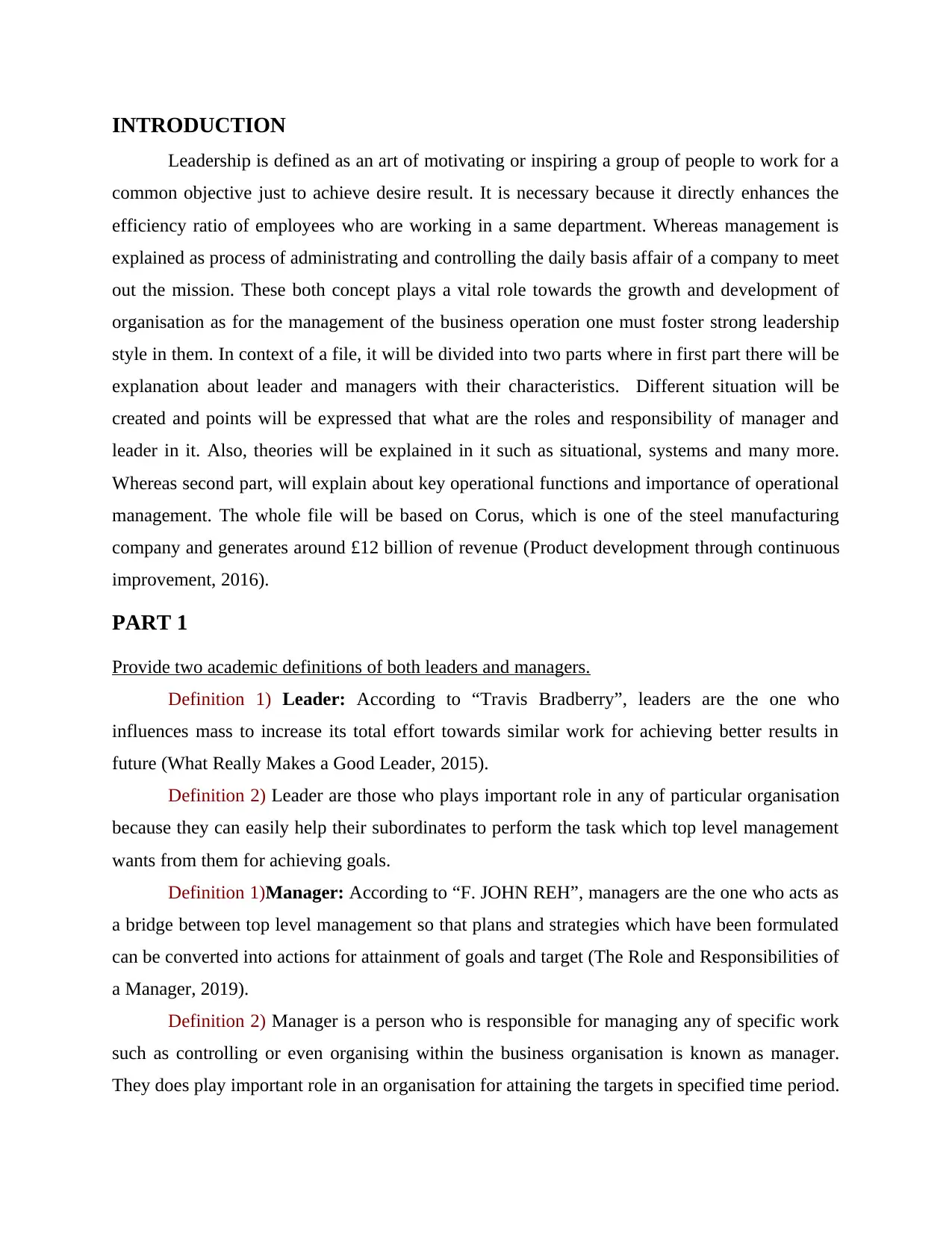
INTRODUCTION
Leadership is defined as an art of motivating or inspiring a group of people to work for a
common objective just to achieve desire result. It is necessary because it directly enhances the
efficiency ratio of employees who are working in a same department. Whereas management is
explained as process of administrating and controlling the daily basis affair of a company to meet
out the mission. These both concept plays a vital role towards the growth and development of
organisation as for the management of the business operation one must foster strong leadership
style in them. In context of a file, it will be divided into two parts where in first part there will be
explanation about leader and managers with their characteristics. Different situation will be
created and points will be expressed that what are the roles and responsibility of manager and
leader in it. Also, theories will be explained in it such as situational, systems and many more.
Whereas second part, will explain about key operational functions and importance of operational
management. The whole file will be based on Corus, which is one of the steel manufacturing
company and generates around £12 billion of revenue (Product development through continuous
improvement, 2016).
PART 1
Provide two academic definitions of both leaders and managers.
Definition 1) Leader: According to “Travis Bradberry”, leaders are the one who
influences mass to increase its total effort towards similar work for achieving better results in
future (What Really Makes a Good Leader, 2015).
Definition 2) Leader are those who plays important role in any of particular organisation
because they can easily help their subordinates to perform the task which top level management
wants from them for achieving goals.
Definition 1)Manager: According to “F. JOHN REH”, managers are the one who acts as
a bridge between top level management so that plans and strategies which have been formulated
can be converted into actions for attainment of goals and target (The Role and Responsibilities of
a Manager, 2019).
Definition 2) Manager is a person who is responsible for managing any of specific work
such as controlling or even organising within the business organisation is known as manager.
They does play important role in an organisation for attaining the targets in specified time period.
Leadership is defined as an art of motivating or inspiring a group of people to work for a
common objective just to achieve desire result. It is necessary because it directly enhances the
efficiency ratio of employees who are working in a same department. Whereas management is
explained as process of administrating and controlling the daily basis affair of a company to meet
out the mission. These both concept plays a vital role towards the growth and development of
organisation as for the management of the business operation one must foster strong leadership
style in them. In context of a file, it will be divided into two parts where in first part there will be
explanation about leader and managers with their characteristics. Different situation will be
created and points will be expressed that what are the roles and responsibility of manager and
leader in it. Also, theories will be explained in it such as situational, systems and many more.
Whereas second part, will explain about key operational functions and importance of operational
management. The whole file will be based on Corus, which is one of the steel manufacturing
company and generates around £12 billion of revenue (Product development through continuous
improvement, 2016).
PART 1
Provide two academic definitions of both leaders and managers.
Definition 1) Leader: According to “Travis Bradberry”, leaders are the one who
influences mass to increase its total effort towards similar work for achieving better results in
future (What Really Makes a Good Leader, 2015).
Definition 2) Leader are those who plays important role in any of particular organisation
because they can easily help their subordinates to perform the task which top level management
wants from them for achieving goals.
Definition 1)Manager: According to “F. JOHN REH”, managers are the one who acts as
a bridge between top level management so that plans and strategies which have been formulated
can be converted into actions for attainment of goals and target (The Role and Responsibilities of
a Manager, 2019).
Definition 2) Manager is a person who is responsible for managing any of specific work
such as controlling or even organising within the business organisation is known as manager.
They does play important role in an organisation for attaining the targets in specified time period.
⊘ This is a preview!⊘
Do you want full access?
Subscribe today to unlock all pages.

Trusted by 1+ million students worldwide
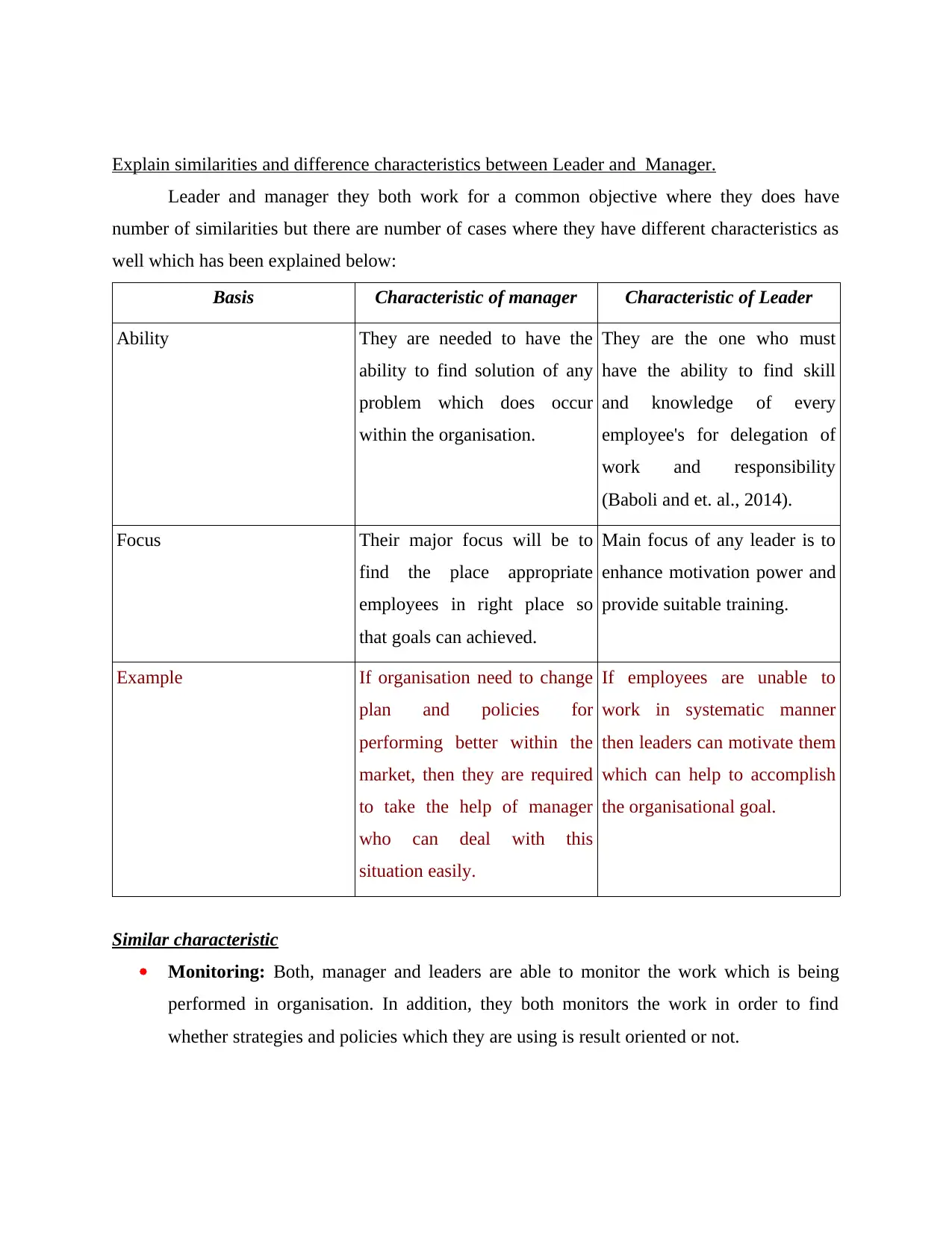
Explain similarities and difference characteristics between Leader and Manager.
Leader and manager they both work for a common objective where they does have
number of similarities but there are number of cases where they have different characteristics as
well which has been explained below:
Basis Characteristic of manager Characteristic of Leader
Ability They are needed to have the
ability to find solution of any
problem which does occur
within the organisation.
They are the one who must
have the ability to find skill
and knowledge of every
employee's for delegation of
work and responsibility
(Baboli and et. al., 2014).
Focus Their major focus will be to
find the place appropriate
employees in right place so
that goals can achieved.
Main focus of any leader is to
enhance motivation power and
provide suitable training.
Example If organisation need to change
plan and policies for
performing better within the
market, then they are required
to take the help of manager
who can deal with this
situation easily.
If employees are unable to
work in systematic manner
then leaders can motivate them
which can help to accomplish
the organisational goal.
Similar characteristic
Monitoring: Both, manager and leaders are able to monitor the work which is being
performed in organisation. In addition, they both monitors the work in order to find
whether strategies and policies which they are using is result oriented or not.
Leader and manager they both work for a common objective where they does have
number of similarities but there are number of cases where they have different characteristics as
well which has been explained below:
Basis Characteristic of manager Characteristic of Leader
Ability They are needed to have the
ability to find solution of any
problem which does occur
within the organisation.
They are the one who must
have the ability to find skill
and knowledge of every
employee's for delegation of
work and responsibility
(Baboli and et. al., 2014).
Focus Their major focus will be to
find the place appropriate
employees in right place so
that goals can achieved.
Main focus of any leader is to
enhance motivation power and
provide suitable training.
Example If organisation need to change
plan and policies for
performing better within the
market, then they are required
to take the help of manager
who can deal with this
situation easily.
If employees are unable to
work in systematic manner
then leaders can motivate them
which can help to accomplish
the organisational goal.
Similar characteristic
Monitoring: Both, manager and leaders are able to monitor the work which is being
performed in organisation. In addition, they both monitors the work in order to find
whether strategies and policies which they are using is result oriented or not.
Paraphrase This Document
Need a fresh take? Get an instant paraphrase of this document with our AI Paraphraser
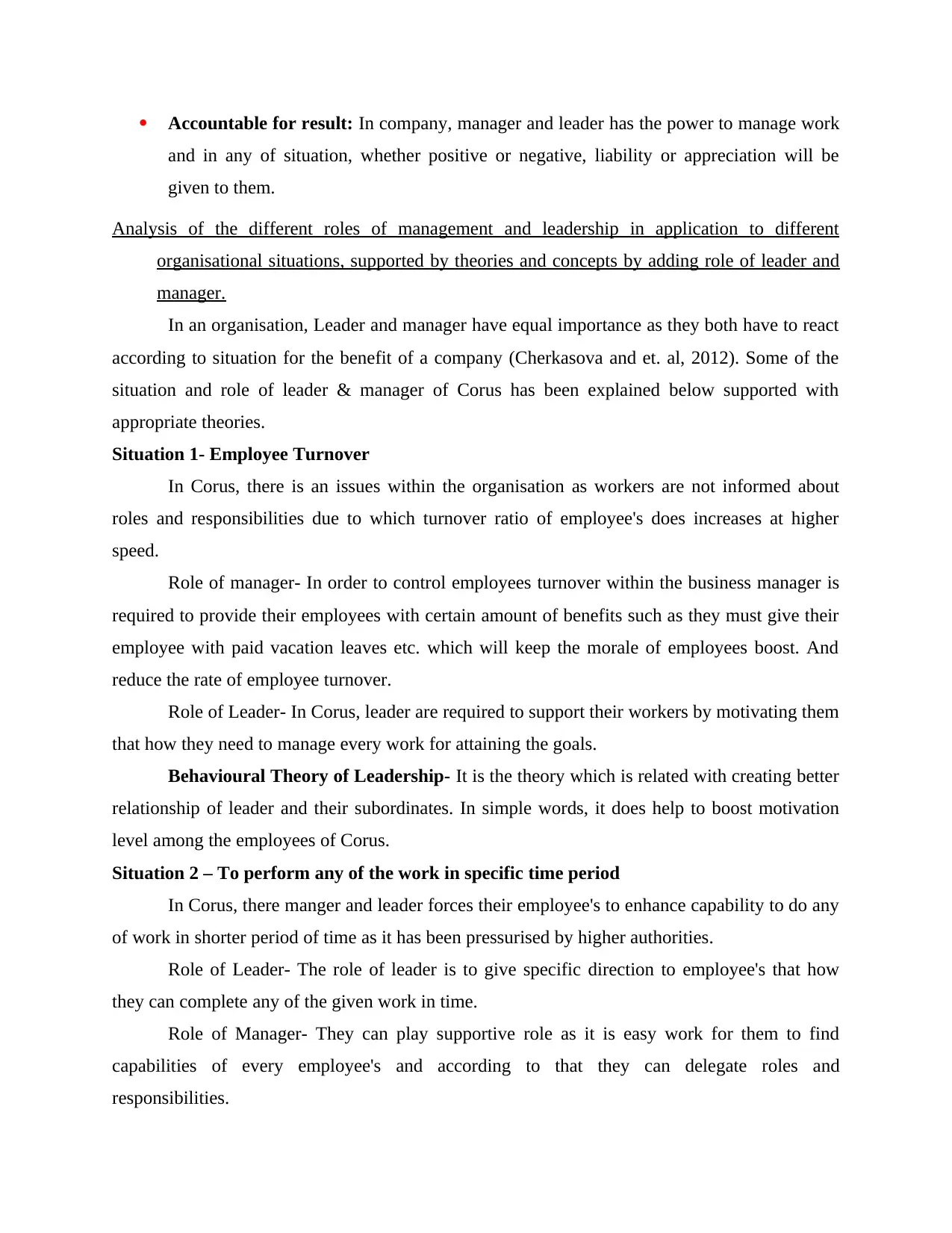
Accountable for result: In company, manager and leader has the power to manage work
and in any of situation, whether positive or negative, liability or appreciation will be
given to them.
Analysis of the different roles of management and leadership in application to different
organisational situations, supported by theories and concepts by adding role of leader and
manager.
In an organisation, Leader and manager have equal importance as they both have to react
according to situation for the benefit of a company (Cherkasova and et. al, 2012). Some of the
situation and role of leader & manager of Corus has been explained below supported with
appropriate theories.
Situation 1- Employee Turnover
In Corus, there is an issues within the organisation as workers are not informed about
roles and responsibilities due to which turnover ratio of employee's does increases at higher
speed.
Role of manager- In order to control employees turnover within the business manager is
required to provide their employees with certain amount of benefits such as they must give their
employee with paid vacation leaves etc. which will keep the morale of employees boost. And
reduce the rate of employee turnover.
Role of Leader- In Corus, leader are required to support their workers by motivating them
that how they need to manage every work for attaining the goals.
Behavioural Theory of Leadership- It is the theory which is related with creating better
relationship of leader and their subordinates. In simple words, it does help to boost motivation
level among the employees of Corus.
Situation 2 – To perform any of the work in specific time period
In Corus, there manger and leader forces their employee's to enhance capability to do any
of work in shorter period of time as it has been pressurised by higher authorities.
Role of Leader- The role of leader is to give specific direction to employee's that how
they can complete any of the given work in time.
Role of Manager- They can play supportive role as it is easy work for them to find
capabilities of every employee's and according to that they can delegate roles and
responsibilities.
and in any of situation, whether positive or negative, liability or appreciation will be
given to them.
Analysis of the different roles of management and leadership in application to different
organisational situations, supported by theories and concepts by adding role of leader and
manager.
In an organisation, Leader and manager have equal importance as they both have to react
according to situation for the benefit of a company (Cherkasova and et. al, 2012). Some of the
situation and role of leader & manager of Corus has been explained below supported with
appropriate theories.
Situation 1- Employee Turnover
In Corus, there is an issues within the organisation as workers are not informed about
roles and responsibilities due to which turnover ratio of employee's does increases at higher
speed.
Role of manager- In order to control employees turnover within the business manager is
required to provide their employees with certain amount of benefits such as they must give their
employee with paid vacation leaves etc. which will keep the morale of employees boost. And
reduce the rate of employee turnover.
Role of Leader- In Corus, leader are required to support their workers by motivating them
that how they need to manage every work for attaining the goals.
Behavioural Theory of Leadership- It is the theory which is related with creating better
relationship of leader and their subordinates. In simple words, it does help to boost motivation
level among the employees of Corus.
Situation 2 – To perform any of the work in specific time period
In Corus, there manger and leader forces their employee's to enhance capability to do any
of work in shorter period of time as it has been pressurised by higher authorities.
Role of Leader- The role of leader is to give specific direction to employee's that how
they can complete any of the given work in time.
Role of Manager- They can play supportive role as it is easy work for them to find
capabilities of every employee's and according to that they can delegate roles and
responsibilities.
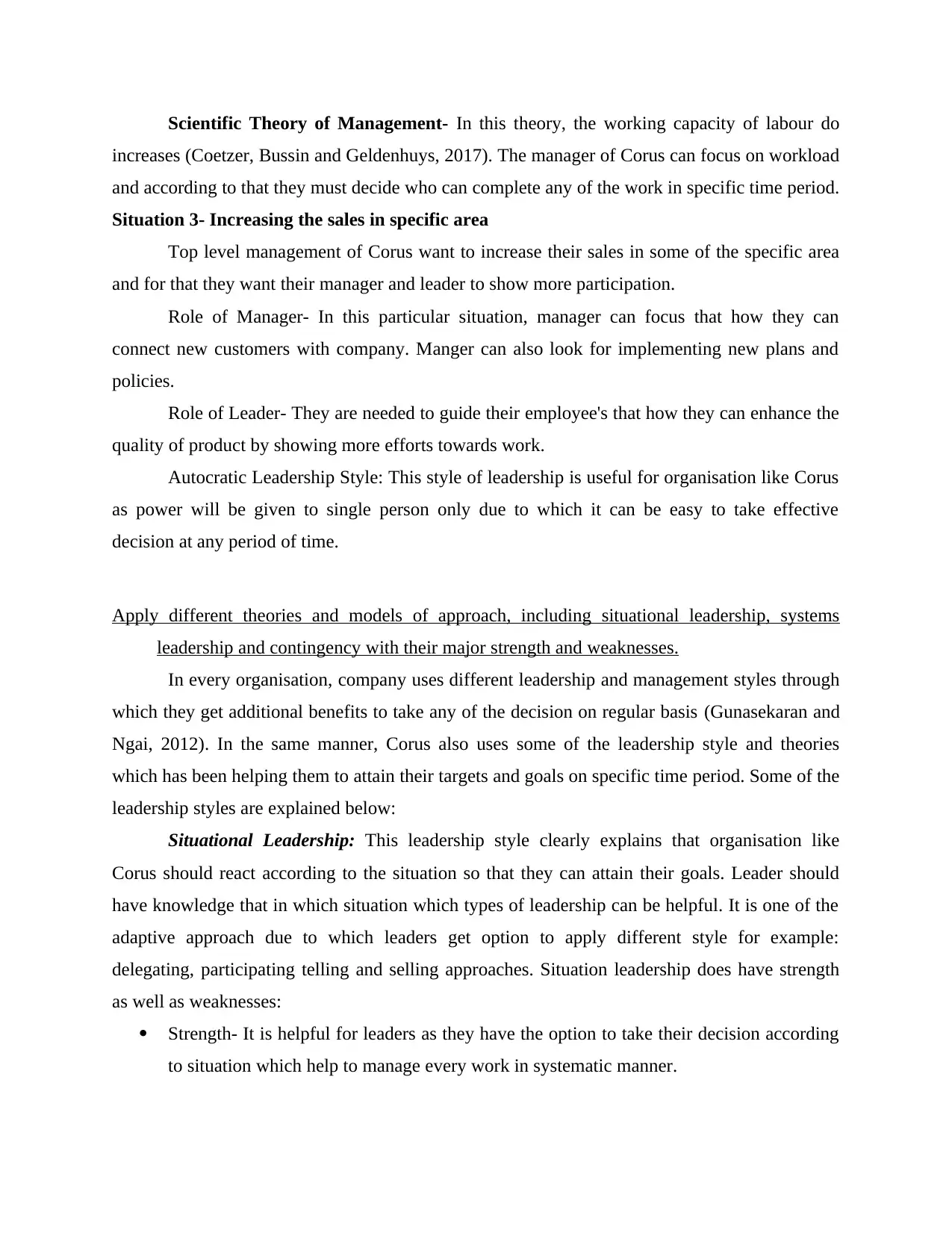
Scientific Theory of Management- In this theory, the working capacity of labour do
increases (Coetzer, Bussin and Geldenhuys, 2017). The manager of Corus can focus on workload
and according to that they must decide who can complete any of the work in specific time period.
Situation 3- Increasing the sales in specific area
Top level management of Corus want to increase their sales in some of the specific area
and for that they want their manager and leader to show more participation.
Role of Manager- In this particular situation, manager can focus that how they can
connect new customers with company. Manger can also look for implementing new plans and
policies.
Role of Leader- They are needed to guide their employee's that how they can enhance the
quality of product by showing more efforts towards work.
Autocratic Leadership Style: This style of leadership is useful for organisation like Corus
as power will be given to single person only due to which it can be easy to take effective
decision at any period of time.
Apply different theories and models of approach, including situational leadership, systems
leadership and contingency with their major strength and weaknesses.
In every organisation, company uses different leadership and management styles through
which they get additional benefits to take any of the decision on regular basis (Gunasekaran and
Ngai, 2012). In the same manner, Corus also uses some of the leadership style and theories
which has been helping them to attain their targets and goals on specific time period. Some of the
leadership styles are explained below:
Situational Leadership: This leadership style clearly explains that organisation like
Corus should react according to the situation so that they can attain their goals. Leader should
have knowledge that in which situation which types of leadership can be helpful. It is one of the
adaptive approach due to which leaders get option to apply different style for example:
delegating, participating telling and selling approaches. Situation leadership does have strength
as well as weaknesses:
Strength- It is helpful for leaders as they have the option to take their decision according
to situation which help to manage every work in systematic manner.
increases (Coetzer, Bussin and Geldenhuys, 2017). The manager of Corus can focus on workload
and according to that they must decide who can complete any of the work in specific time period.
Situation 3- Increasing the sales in specific area
Top level management of Corus want to increase their sales in some of the specific area
and for that they want their manager and leader to show more participation.
Role of Manager- In this particular situation, manager can focus that how they can
connect new customers with company. Manger can also look for implementing new plans and
policies.
Role of Leader- They are needed to guide their employee's that how they can enhance the
quality of product by showing more efforts towards work.
Autocratic Leadership Style: This style of leadership is useful for organisation like Corus
as power will be given to single person only due to which it can be easy to take effective
decision at any period of time.
Apply different theories and models of approach, including situational leadership, systems
leadership and contingency with their major strength and weaknesses.
In every organisation, company uses different leadership and management styles through
which they get additional benefits to take any of the decision on regular basis (Gunasekaran and
Ngai, 2012). In the same manner, Corus also uses some of the leadership style and theories
which has been helping them to attain their targets and goals on specific time period. Some of the
leadership styles are explained below:
Situational Leadership: This leadership style clearly explains that organisation like
Corus should react according to the situation so that they can attain their goals. Leader should
have knowledge that in which situation which types of leadership can be helpful. It is one of the
adaptive approach due to which leaders get option to apply different style for example:
delegating, participating telling and selling approaches. Situation leadership does have strength
as well as weaknesses:
Strength- It is helpful for leaders as they have the option to take their decision according
to situation which help to manage every work in systematic manner.
⊘ This is a preview!⊘
Do you want full access?
Subscribe today to unlock all pages.

Trusted by 1+ million students worldwide
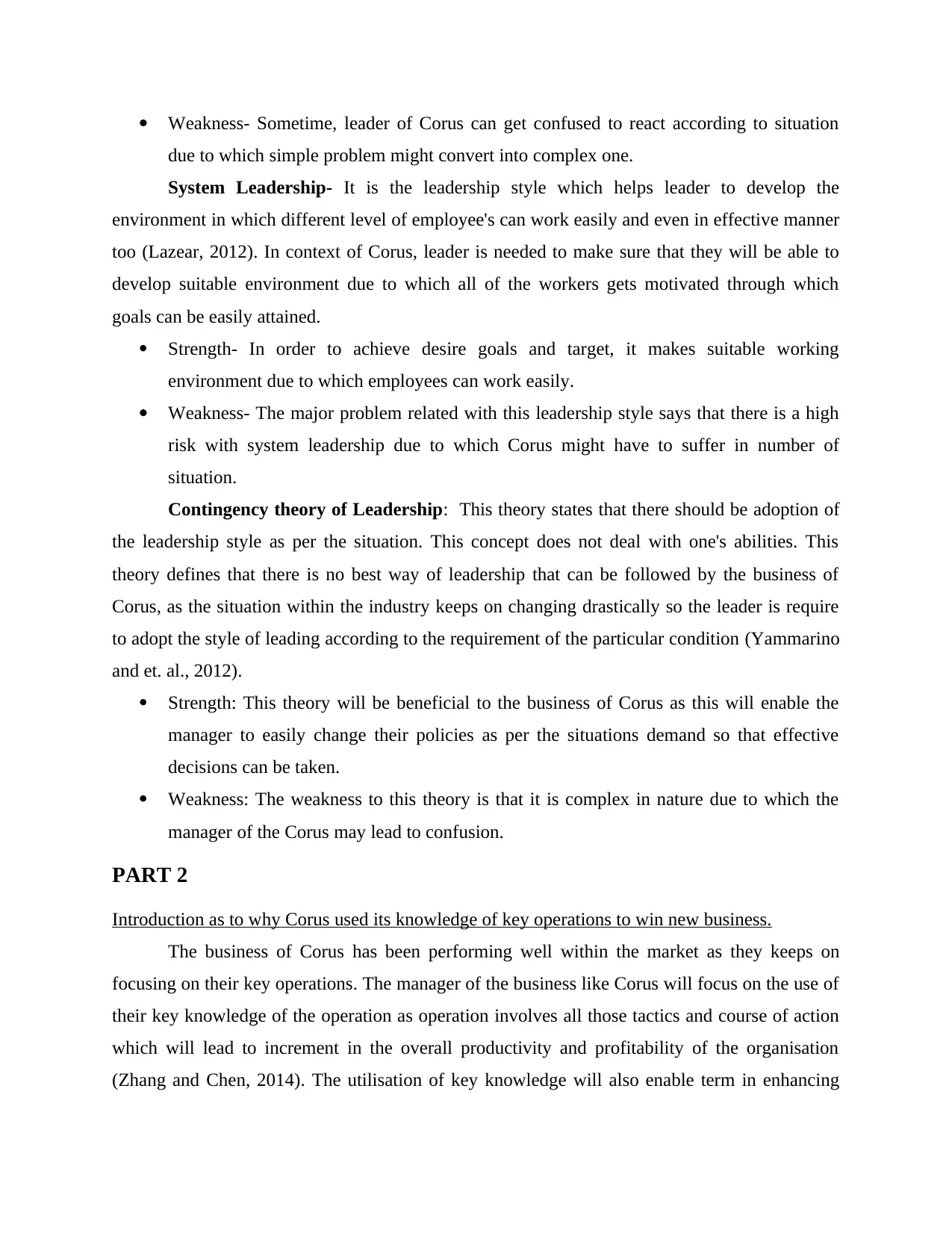
Weakness- Sometime, leader of Corus can get confused to react according to situation
due to which simple problem might convert into complex one.
System Leadership- It is the leadership style which helps leader to develop the
environment in which different level of employee's can work easily and even in effective manner
too (Lazear, 2012). In context of Corus, leader is needed to make sure that they will be able to
develop suitable environment due to which all of the workers gets motivated through which
goals can be easily attained.
Strength- In order to achieve desire goals and target, it makes suitable working
environment due to which employees can work easily.
Weakness- The major problem related with this leadership style says that there is a high
risk with system leadership due to which Corus might have to suffer in number of
situation.
Contingency theory of Leadership: This theory states that there should be adoption of
the leadership style as per the situation. This concept does not deal with one's abilities. This
theory defines that there is no best way of leadership that can be followed by the business of
Corus, as the situation within the industry keeps on changing drastically so the leader is require
to adopt the style of leading according to the requirement of the particular condition (Yammarino
and et. al., 2012).
Strength: This theory will be beneficial to the business of Corus as this will enable the
manager to easily change their policies as per the situations demand so that effective
decisions can be taken.
Weakness: The weakness to this theory is that it is complex in nature due to which the
manager of the Corus may lead to confusion.
PART 2
Introduction as to why Corus used its knowledge of key operations to win new business.
The business of Corus has been performing well within the market as they keeps on
focusing on their key operations. The manager of the business like Corus will focus on the use of
their key knowledge of the operation as operation involves all those tactics and course of action
which will lead to increment in the overall productivity and profitability of the organisation
(Zhang and Chen, 2014). The utilisation of key knowledge will also enable term in enhancing
due to which simple problem might convert into complex one.
System Leadership- It is the leadership style which helps leader to develop the
environment in which different level of employee's can work easily and even in effective manner
too (Lazear, 2012). In context of Corus, leader is needed to make sure that they will be able to
develop suitable environment due to which all of the workers gets motivated through which
goals can be easily attained.
Strength- In order to achieve desire goals and target, it makes suitable working
environment due to which employees can work easily.
Weakness- The major problem related with this leadership style says that there is a high
risk with system leadership due to which Corus might have to suffer in number of
situation.
Contingency theory of Leadership: This theory states that there should be adoption of
the leadership style as per the situation. This concept does not deal with one's abilities. This
theory defines that there is no best way of leadership that can be followed by the business of
Corus, as the situation within the industry keeps on changing drastically so the leader is require
to adopt the style of leading according to the requirement of the particular condition (Yammarino
and et. al., 2012).
Strength: This theory will be beneficial to the business of Corus as this will enable the
manager to easily change their policies as per the situations demand so that effective
decisions can be taken.
Weakness: The weakness to this theory is that it is complex in nature due to which the
manager of the Corus may lead to confusion.
PART 2
Introduction as to why Corus used its knowledge of key operations to win new business.
The business of Corus has been performing well within the market as they keeps on
focusing on their key operations. The manager of the business like Corus will focus on the use of
their key knowledge of the operation as operation involves all those tactics and course of action
which will lead to increment in the overall productivity and profitability of the organisation
(Zhang and Chen, 2014). The utilisation of key knowledge will also enable term in enhancing
Paraphrase This Document
Need a fresh take? Get an instant paraphrase of this document with our AI Paraphraser
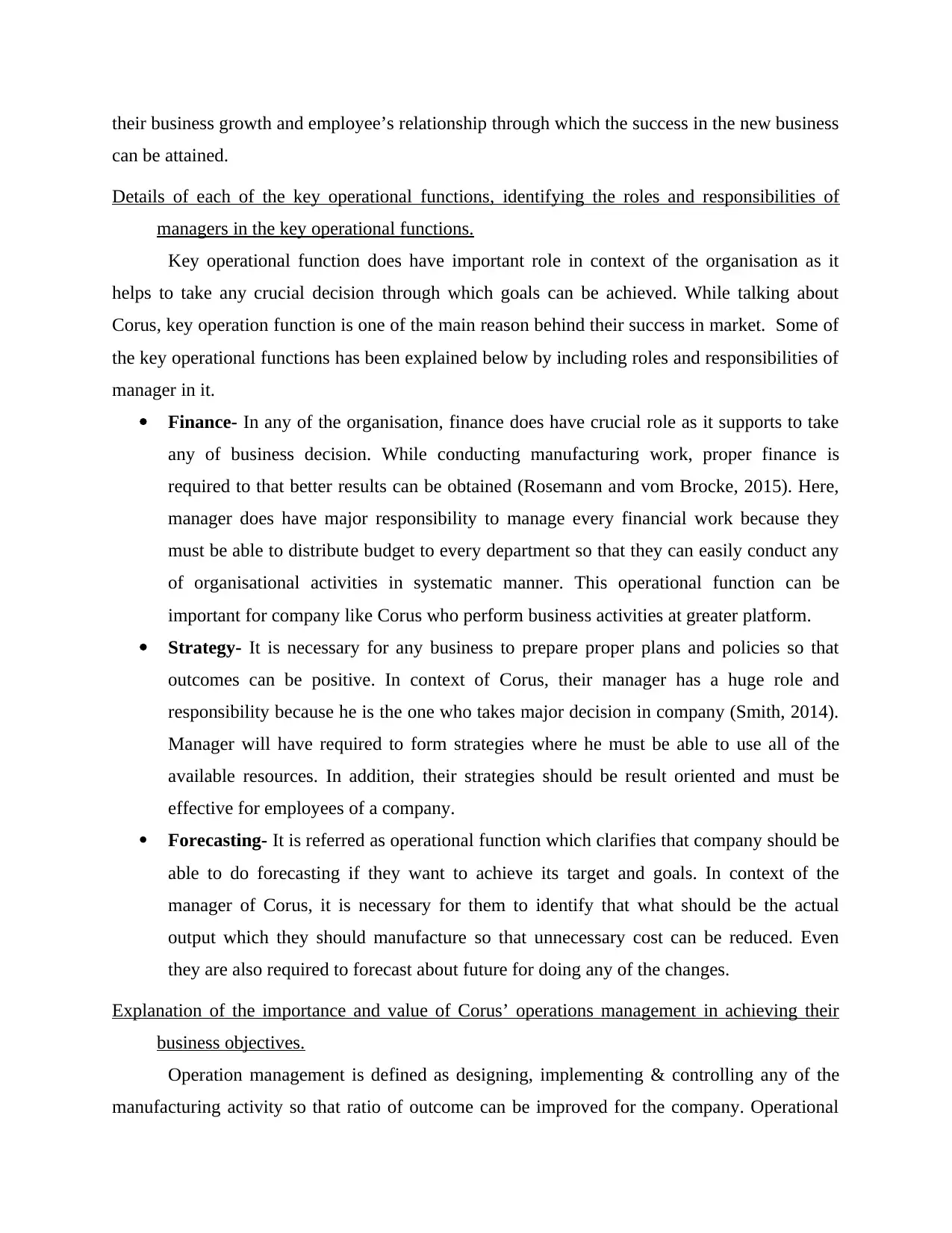
their business growth and employee’s relationship through which the success in the new business
can be attained.
Details of each of the key operational functions, identifying the roles and responsibilities of
managers in the key operational functions.
Key operational function does have important role in context of the organisation as it
helps to take any crucial decision through which goals can be achieved. While talking about
Corus, key operation function is one of the main reason behind their success in market. Some of
the key operational functions has been explained below by including roles and responsibilities of
manager in it.
Finance- In any of the organisation, finance does have crucial role as it supports to take
any of business decision. While conducting manufacturing work, proper finance is
required to that better results can be obtained (Rosemann and vom Brocke, 2015). Here,
manager does have major responsibility to manage every financial work because they
must be able to distribute budget to every department so that they can easily conduct any
of organisational activities in systematic manner. This operational function can be
important for company like Corus who perform business activities at greater platform.
Strategy- It is necessary for any business to prepare proper plans and policies so that
outcomes can be positive. In context of Corus, their manager has a huge role and
responsibility because he is the one who takes major decision in company (Smith, 2014).
Manager will have required to form strategies where he must be able to use all of the
available resources. In addition, their strategies should be result oriented and must be
effective for employees of a company.
Forecasting- It is referred as operational function which clarifies that company should be
able to do forecasting if they want to achieve its target and goals. In context of the
manager of Corus, it is necessary for them to identify that what should be the actual
output which they should manufacture so that unnecessary cost can be reduced. Even
they are also required to forecast about future for doing any of the changes.
Explanation of the importance and value of Corus’ operations management in achieving their
business objectives.
Operation management is defined as designing, implementing & controlling any of the
manufacturing activity so that ratio of outcome can be improved for the company. Operational
can be attained.
Details of each of the key operational functions, identifying the roles and responsibilities of
managers in the key operational functions.
Key operational function does have important role in context of the organisation as it
helps to take any crucial decision through which goals can be achieved. While talking about
Corus, key operation function is one of the main reason behind their success in market. Some of
the key operational functions has been explained below by including roles and responsibilities of
manager in it.
Finance- In any of the organisation, finance does have crucial role as it supports to take
any of business decision. While conducting manufacturing work, proper finance is
required to that better results can be obtained (Rosemann and vom Brocke, 2015). Here,
manager does have major responsibility to manage every financial work because they
must be able to distribute budget to every department so that they can easily conduct any
of organisational activities in systematic manner. This operational function can be
important for company like Corus who perform business activities at greater platform.
Strategy- It is necessary for any business to prepare proper plans and policies so that
outcomes can be positive. In context of Corus, their manager has a huge role and
responsibility because he is the one who takes major decision in company (Smith, 2014).
Manager will have required to form strategies where he must be able to use all of the
available resources. In addition, their strategies should be result oriented and must be
effective for employees of a company.
Forecasting- It is referred as operational function which clarifies that company should be
able to do forecasting if they want to achieve its target and goals. In context of the
manager of Corus, it is necessary for them to identify that what should be the actual
output which they should manufacture so that unnecessary cost can be reduced. Even
they are also required to forecast about future for doing any of the changes.
Explanation of the importance and value of Corus’ operations management in achieving their
business objectives.
Operation management is defined as designing, implementing & controlling any of the
manufacturing activity so that ratio of outcome can be improved for the company. Operational
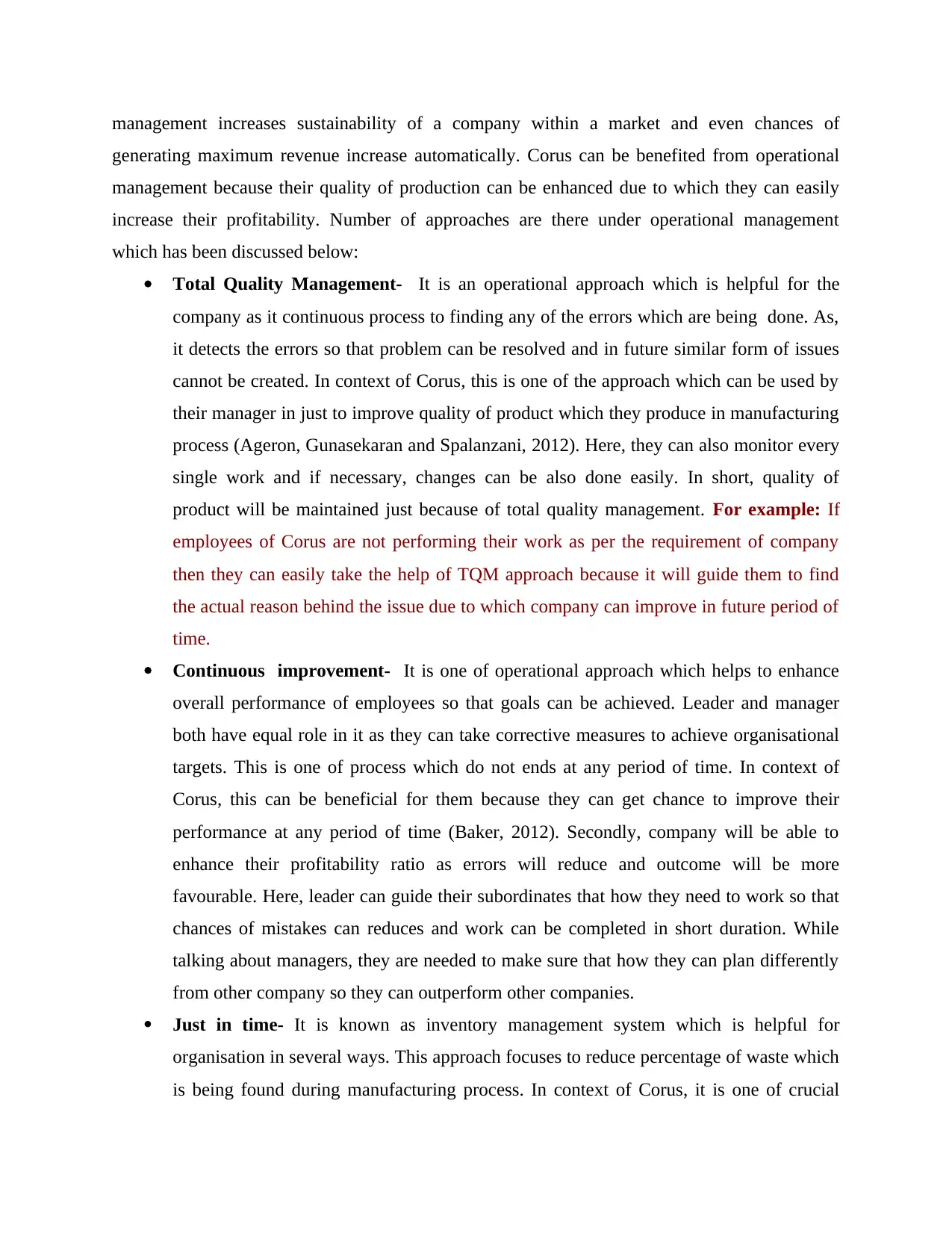
management increases sustainability of a company within a market and even chances of
generating maximum revenue increase automatically. Corus can be benefited from operational
management because their quality of production can be enhanced due to which they can easily
increase their profitability. Number of approaches are there under operational management
which has been discussed below:
Total Quality Management- It is an operational approach which is helpful for the
company as it continuous process to finding any of the errors which are being done. As,
it detects the errors so that problem can be resolved and in future similar form of issues
cannot be created. In context of Corus, this is one of the approach which can be used by
their manager in just to improve quality of product which they produce in manufacturing
process (Ageron, Gunasekaran and Spalanzani, 2012). Here, they can also monitor every
single work and if necessary, changes can be also done easily. In short, quality of
product will be maintained just because of total quality management. For example: If
employees of Corus are not performing their work as per the requirement of company
then they can easily take the help of TQM approach because it will guide them to find
the actual reason behind the issue due to which company can improve in future period of
time.
Continuous improvement- It is one of operational approach which helps to enhance
overall performance of employees so that goals can be achieved. Leader and manager
both have equal role in it as they can take corrective measures to achieve organisational
targets. This is one of process which do not ends at any period of time. In context of
Corus, this can be beneficial for them because they can get chance to improve their
performance at any period of time (Baker, 2012). Secondly, company will be able to
enhance their profitability ratio as errors will reduce and outcome will be more
favourable. Here, leader can guide their subordinates that how they need to work so that
chances of mistakes can reduces and work can be completed in short duration. While
talking about managers, they are needed to make sure that how they can plan differently
from other company so they can outperform other companies.
Just in time- It is known as inventory management system which is helpful for
organisation in several ways. This approach focuses to reduce percentage of waste which
is being found during manufacturing process. In context of Corus, it is one of crucial
generating maximum revenue increase automatically. Corus can be benefited from operational
management because their quality of production can be enhanced due to which they can easily
increase their profitability. Number of approaches are there under operational management
which has been discussed below:
Total Quality Management- It is an operational approach which is helpful for the
company as it continuous process to finding any of the errors which are being done. As,
it detects the errors so that problem can be resolved and in future similar form of issues
cannot be created. In context of Corus, this is one of the approach which can be used by
their manager in just to improve quality of product which they produce in manufacturing
process (Ageron, Gunasekaran and Spalanzani, 2012). Here, they can also monitor every
single work and if necessary, changes can be also done easily. In short, quality of
product will be maintained just because of total quality management. For example: If
employees of Corus are not performing their work as per the requirement of company
then they can easily take the help of TQM approach because it will guide them to find
the actual reason behind the issue due to which company can improve in future period of
time.
Continuous improvement- It is one of operational approach which helps to enhance
overall performance of employees so that goals can be achieved. Leader and manager
both have equal role in it as they can take corrective measures to achieve organisational
targets. This is one of process which do not ends at any period of time. In context of
Corus, this can be beneficial for them because they can get chance to improve their
performance at any period of time (Baker, 2012). Secondly, company will be able to
enhance their profitability ratio as errors will reduce and outcome will be more
favourable. Here, leader can guide their subordinates that how they need to work so that
chances of mistakes can reduces and work can be completed in short duration. While
talking about managers, they are needed to make sure that how they can plan differently
from other company so they can outperform other companies.
Just in time- It is known as inventory management system which is helpful for
organisation in several ways. This approach focuses to reduce percentage of waste which
is being found during manufacturing process. In context of Corus, it is one of crucial
⊘ This is a preview!⊘
Do you want full access?
Subscribe today to unlock all pages.

Trusted by 1+ million students worldwide
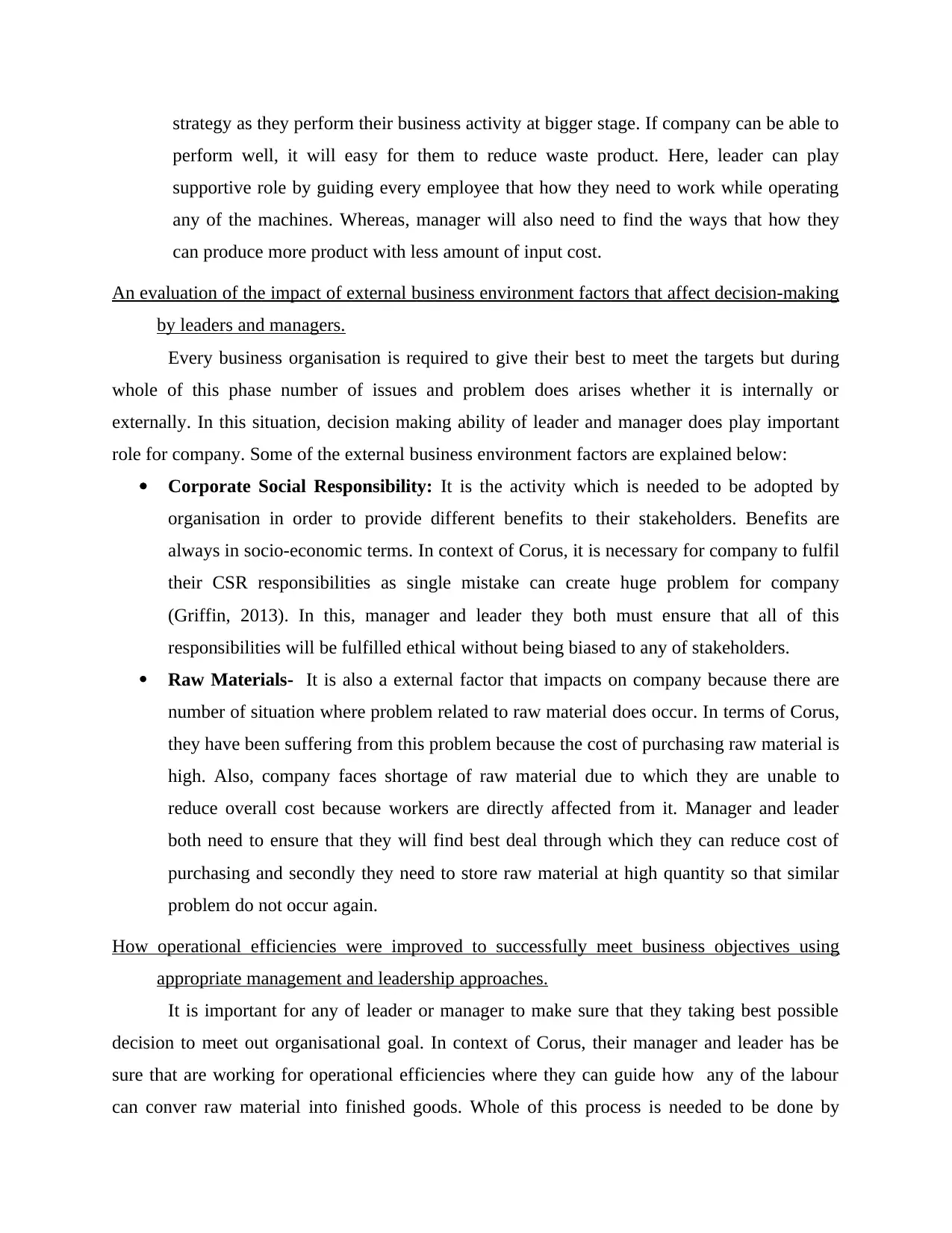
strategy as they perform their business activity at bigger stage. If company can be able to
perform well, it will easy for them to reduce waste product. Here, leader can play
supportive role by guiding every employee that how they need to work while operating
any of the machines. Whereas, manager will also need to find the ways that how they
can produce more product with less amount of input cost.
An evaluation of the impact of external business environment factors that affect decision-making
by leaders and managers.
Every business organisation is required to give their best to meet the targets but during
whole of this phase number of issues and problem does arises whether it is internally or
externally. In this situation, decision making ability of leader and manager does play important
role for company. Some of the external business environment factors are explained below:
Corporate Social Responsibility: It is the activity which is needed to be adopted by
organisation in order to provide different benefits to their stakeholders. Benefits are
always in socio-economic terms. In context of Corus, it is necessary for company to fulfil
their CSR responsibilities as single mistake can create huge problem for company
(Griffin, 2013). In this, manager and leader they both must ensure that all of this
responsibilities will be fulfilled ethical without being biased to any of stakeholders.
Raw Materials- It is also a external factor that impacts on company because there are
number of situation where problem related to raw material does occur. In terms of Corus,
they have been suffering from this problem because the cost of purchasing raw material is
high. Also, company faces shortage of raw material due to which they are unable to
reduce overall cost because workers are directly affected from it. Manager and leader
both need to ensure that they will find best deal through which they can reduce cost of
purchasing and secondly they need to store raw material at high quantity so that similar
problem do not occur again.
How operational efficiencies were improved to successfully meet business objectives using
appropriate management and leadership approaches.
It is important for any of leader or manager to make sure that they taking best possible
decision to meet out organisational goal. In context of Corus, their manager and leader has be
sure that are working for operational efficiencies where they can guide how any of the labour
can conver raw material into finished goods. Whole of this process is needed to be done by
perform well, it will easy for them to reduce waste product. Here, leader can play
supportive role by guiding every employee that how they need to work while operating
any of the machines. Whereas, manager will also need to find the ways that how they
can produce more product with less amount of input cost.
An evaluation of the impact of external business environment factors that affect decision-making
by leaders and managers.
Every business organisation is required to give their best to meet the targets but during
whole of this phase number of issues and problem does arises whether it is internally or
externally. In this situation, decision making ability of leader and manager does play important
role for company. Some of the external business environment factors are explained below:
Corporate Social Responsibility: It is the activity which is needed to be adopted by
organisation in order to provide different benefits to their stakeholders. Benefits are
always in socio-economic terms. In context of Corus, it is necessary for company to fulfil
their CSR responsibilities as single mistake can create huge problem for company
(Griffin, 2013). In this, manager and leader they both must ensure that all of this
responsibilities will be fulfilled ethical without being biased to any of stakeholders.
Raw Materials- It is also a external factor that impacts on company because there are
number of situation where problem related to raw material does occur. In terms of Corus,
they have been suffering from this problem because the cost of purchasing raw material is
high. Also, company faces shortage of raw material due to which they are unable to
reduce overall cost because workers are directly affected from it. Manager and leader
both need to ensure that they will find best deal through which they can reduce cost of
purchasing and secondly they need to store raw material at high quantity so that similar
problem do not occur again.
How operational efficiencies were improved to successfully meet business objectives using
appropriate management and leadership approaches.
It is important for any of leader or manager to make sure that they taking best possible
decision to meet out organisational goal. In context of Corus, their manager and leader has be
sure that are working for operational efficiencies where they can guide how any of the labour
can conver raw material into finished goods. Whole of this process is needed to be done by
Paraphrase This Document
Need a fresh take? Get an instant paraphrase of this document with our AI Paraphraser
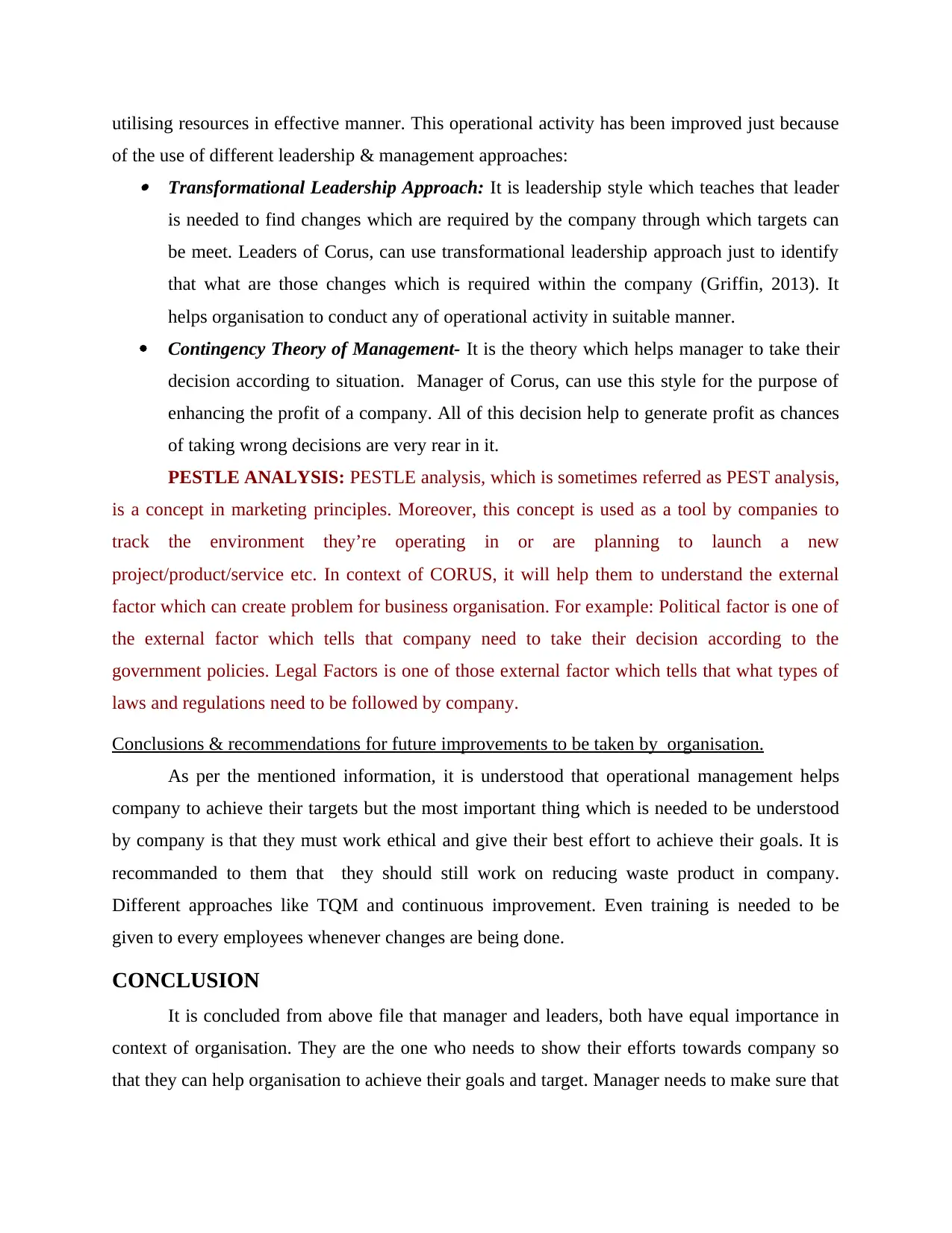
utilising resources in effective manner. This operational activity has been improved just because
of the use of different leadership & management approaches: Transformational Leadership Approach: It is leadership style which teaches that leader
is needed to find changes which are required by the company through which targets can
be meet. Leaders of Corus, can use transformational leadership approach just to identify
that what are those changes which is required within the company (Griffin, 2013). It
helps organisation to conduct any of operational activity in suitable manner.
Contingency Theory of Management- It is the theory which helps manager to take their
decision according to situation. Manager of Corus, can use this style for the purpose of
enhancing the profit of a company. All of this decision help to generate profit as chances
of taking wrong decisions are very rear in it.
PESTLE ANALYSIS: PESTLE analysis, which is sometimes referred as PEST analysis,
is a concept in marketing principles. Moreover, this concept is used as a tool by companies to
track the environment they’re operating in or are planning to launch a new
project/product/service etc. In context of CORUS, it will help them to understand the external
factor which can create problem for business organisation. For example: Political factor is one of
the external factor which tells that company need to take their decision according to the
government policies. Legal Factors is one of those external factor which tells that what types of
laws and regulations need to be followed by company.
Conclusions & recommendations for future improvements to be taken by organisation.
As per the mentioned information, it is understood that operational management helps
company to achieve their targets but the most important thing which is needed to be understood
by company is that they must work ethical and give their best effort to achieve their goals. It is
recommanded to them that they should still work on reducing waste product in company.
Different approaches like TQM and continuous improvement. Even training is needed to be
given to every employees whenever changes are being done.
CONCLUSION
It is concluded from above file that manager and leaders, both have equal importance in
context of organisation. They are the one who needs to show their efforts towards company so
that they can help organisation to achieve their goals and target. Manager needs to make sure that
of the use of different leadership & management approaches: Transformational Leadership Approach: It is leadership style which teaches that leader
is needed to find changes which are required by the company through which targets can
be meet. Leaders of Corus, can use transformational leadership approach just to identify
that what are those changes which is required within the company (Griffin, 2013). It
helps organisation to conduct any of operational activity in suitable manner.
Contingency Theory of Management- It is the theory which helps manager to take their
decision according to situation. Manager of Corus, can use this style for the purpose of
enhancing the profit of a company. All of this decision help to generate profit as chances
of taking wrong decisions are very rear in it.
PESTLE ANALYSIS: PESTLE analysis, which is sometimes referred as PEST analysis,
is a concept in marketing principles. Moreover, this concept is used as a tool by companies to
track the environment they’re operating in or are planning to launch a new
project/product/service etc. In context of CORUS, it will help them to understand the external
factor which can create problem for business organisation. For example: Political factor is one of
the external factor which tells that company need to take their decision according to the
government policies. Legal Factors is one of those external factor which tells that what types of
laws and regulations need to be followed by company.
Conclusions & recommendations for future improvements to be taken by organisation.
As per the mentioned information, it is understood that operational management helps
company to achieve their targets but the most important thing which is needed to be understood
by company is that they must work ethical and give their best effort to achieve their goals. It is
recommanded to them that they should still work on reducing waste product in company.
Different approaches like TQM and continuous improvement. Even training is needed to be
given to every employees whenever changes are being done.
CONCLUSION
It is concluded from above file that manager and leaders, both have equal importance in
context of organisation. They are the one who needs to show their efforts towards company so
that they can help organisation to achieve their goals and target. Manager needs to make sure that
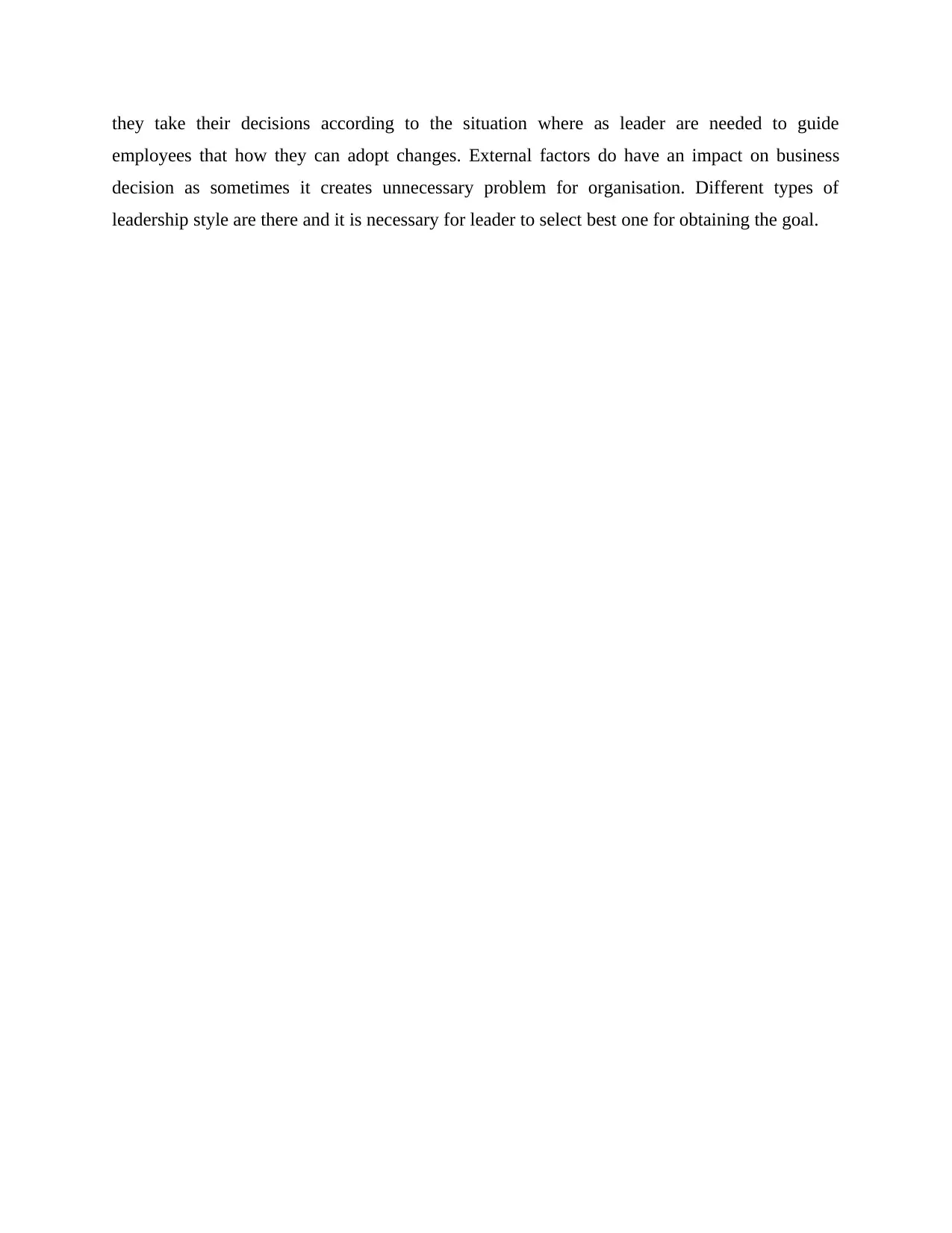
they take their decisions according to the situation where as leader are needed to guide
employees that how they can adopt changes. External factors do have an impact on business
decision as sometimes it creates unnecessary problem for organisation. Different types of
leadership style are there and it is necessary for leader to select best one for obtaining the goal.
employees that how they can adopt changes. External factors do have an impact on business
decision as sometimes it creates unnecessary problem for organisation. Different types of
leadership style are there and it is necessary for leader to select best one for obtaining the goal.
⊘ This is a preview!⊘
Do you want full access?
Subscribe today to unlock all pages.

Trusted by 1+ million students worldwide
1 out of 13
Related Documents
Your All-in-One AI-Powered Toolkit for Academic Success.
+13062052269
info@desklib.com
Available 24*7 on WhatsApp / Email
![[object Object]](/_next/static/media/star-bottom.7253800d.svg)
Unlock your academic potential
Copyright © 2020–2026 A2Z Services. All Rights Reserved. Developed and managed by ZUCOL.



